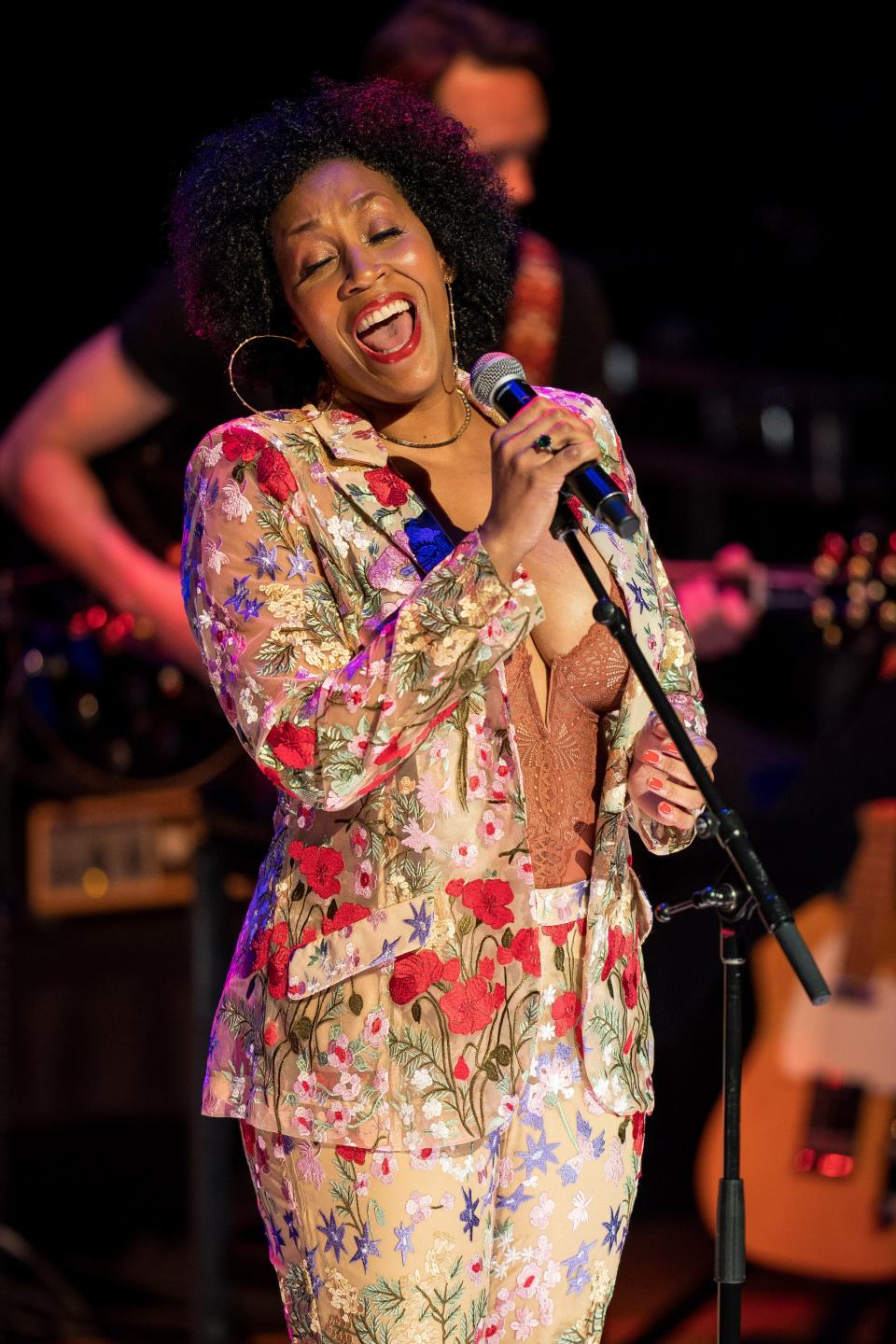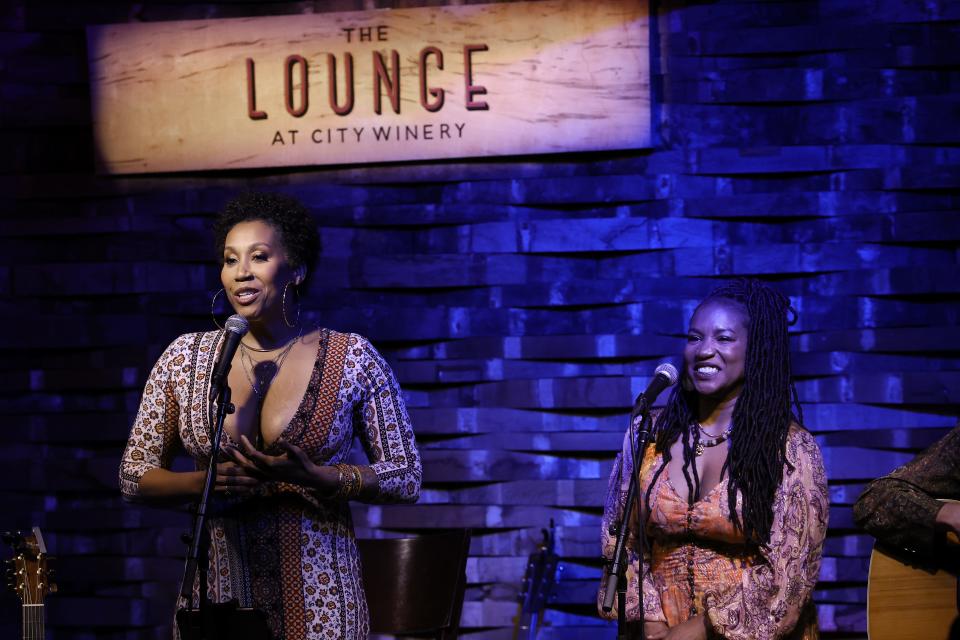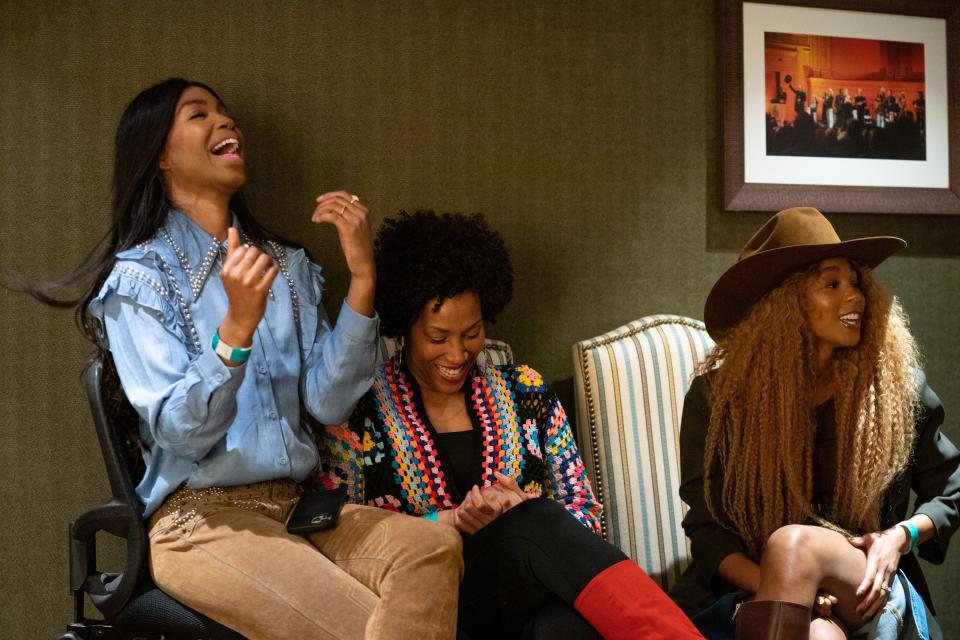Rissi Palmer hosts event, reminds Nashville of the Black women country music left behind
From 1975 and 1979, Ruby Falls, a Black woman from West Tennessee, had nine singles crack the top-100 of the country charts. Her most successful, “You’ve Got to Mend This Heartache” (1977), peaked at 40 and remained on the charts for eight weeks.
Yet many people — even the most die-hard country fans, even the die-hard fans country fans with a concern for the industry's lack of diversity — have never heard of her.
This isn’t a testament to Falls’s talent or marketability; she was a regular in industry circles, appearing on The Ralph Emery Show and being recognized as a rising country star by trade magazines. She was even the star shortstop of Barbara Mandrell’s Do-Rites softball team.
More than anything, her present anonymity speaks to country music’s reluctance to support Black female artists. Now, instead of being regularly mentioned in an industry that thrives on nostalgia and honoring those who came before, Falls is a deeply buried footnote, without even a Wikipedia page.
“I’m not making the big bucks or coming up with any bestselling records,” Falls told journalist Red O’Donnell in 1979. “[…] I’m going to keep on trying and trying and trying. But if something doesn’t happen real soon I may change my name. How do you think ‘Ruby Fails’ would sound?”
Nobody else was doing this kind of work
Falls isn’t the only Black female country artist to have suffered a similar fate. Rissi Palmer, an industry advocate and host of Apple Radio’s Color Me Country Radio, learned this the hard way while producing a show to coincide with the release of Beyoncé’s "Cowboy Carter." “I felt like so much of the attention was on the album itself,” Palmer says, “but I just wanted to remind people that a Black woman wanting to do country music is not new, and I wanted to make sure we acknowledge those artists.”
After some digging, she found a slew of Black women who’d released country music as early as 1962 (“Too Many Chicks,” by Leona Douglas). But accessing the music for her show proved far more difficult. In most cases, Palmer couldn't find label contacts who could give permission and send files; neither were the songs available on streaming. So after the “Say Her Name” episode of Color Me Country Radio aired on March 30, she went to work tracking them down.

On Thursday, at a listening party at Nashville’s Soho House also titled “Say Her Name,” Palmer spun those old 45s she sourced from Amazon and eBay. The playlist included Tina Turner, The Pointer Sisters, and The Supremes — but also Douglas, Falls, LaMelle Prince, and Virginia Cooper, plus another handful of artists whose names had been lost to history. Palmer says it was a celebration born from frustration.
“I don’t see anybody else doing it, and I don’t know that anybody else would.”
Country music has had cycles of diversity pushes, but then what?
Amid the current wave of increased exposure for Black female country artists, no one wants to talk about the industry’s cyclical past. Black women were always here, always trying to build careers, always fighting against the forces that kept them off major labels and country radio.
Until, suddenly, they weren’t. Until country’s power players moved on from the diversity push of the moment and settled back into the status quo. Until Falls, et al, were relegated to obscurity.
Palmer is particularly attuned to this phenomenon because she is also an artist herself. Her debut, “Country Girl” rose to No. 54 on the Hot Country Songs chart in 2007; the following year, “No Air,” her cover of the Chris Brown/Jordin Sparks duet, reached No. 47. But within a couple years she was gone from Nashville.
A decade later, when country music faced its so-called reckoning, Palmer’s career — a career that pre-dated those of many of the artists then being elevated to promote industry diversity — seemed forgotten.
Palmer secured a hosting gig with CMT and was tapped to film promo footage for the 2021 network special "Giants: Charley Pride." She was not, however, asked to join artists (including Mickey Guyton and newcomer Reyna Roberts) to sing in tribute to country music’s first Black superstar.
Palmer hasn’t been tapped to perform on any of the big awards shows that sought to diversify its stages in recent years. And most recently, though she was asked to curate a Color Me Country stage at CMA Fest, she was again overlooked as an artist. She hasn’t been invited to play the festival since 2008.
“I very well could’ve been one of these artists [like Ruby Falls or Leona Douglas]. My story very much could’ve been a footnote. It could’ve been over in 2009, but I just decided that wasn’t the case.”
Structural change is difficult and incomplete
Palmer is currently working on new music. Perhaps more important, she’s made it her mission to introduce country music fans to the women who laid the path that she and so many others have followed.

Within these stories is another message, one for artists, including those whose names are currently at the tips of industry tongues. Namely, it’s that country music has never done the work to help Black women build sustainable careers — not the kind that last beyond a decade or more, that translate to earnings that last for generations, and that establish Black women as legacy artists who become members of the Grand Ole Opry and inductees into the Country Music Hall of Fame. To date, no Black female artist has received either distinction.
Is it possible to be successful outside of the country music industry? According to Palmer, it depends on how you define “success.” Artists can certainly sell tickets to shows and rack up streams. But without mainstream support, she cautions that earnings will likely be lower; booking major festivals will be much harder; and being nominated for the biggest industry awards will be all but impossible.
Palmer points to Black women like Tanner Adel and Brittney Spencer, both of whom have signed label deals outside of Nashville. “They’re having a great moment, and I’m glad for that. There’s no ‘but’ coming," she says. "The next sentence is: We can’t just be excited about and concerned for five people [who were featured on "Cowboy Carter"]. All of those successes came from outside of Nashville. There also has to be concern for the structures that impact everyone else.”
(Notably, Tiera Kennedy, who sung with Adel, Spencer, and Reyna Roberts on "Cowboy Carter's" “Blackbiird,” was signed to Nashville’s Big Machine in 2021. She was dropped earlier this year after failing to gain any traction at country radio.)
Structural change is the hard part, the part that remains undone even as internet headlines blare that change is upon us. Palmer understands that. And she knows that even if the industry truly commits to inclusivity — that is, not just signing Black women, but learning how to market them effectively to ensure their success — the process won’t be completed overnight.

So in the meantime, she hosts her radio show and events like “Say Her Name,” sharing the stories of the women the industry left behind.
“I just believe everybody has a story, and everybody deserves, at some point, to be heard,” Palmer says. “I don’t think these women were given their due. And I think, at the end of the day, that’s what everybody wants.”
Andrea Williams is an opinion columnist for The Tennessean and curator of the Black Tennessee Voices initiative.
This article originally appeared on Nashville Tennessean: Rissi Palmer steps up for Black women artists when country music won't

